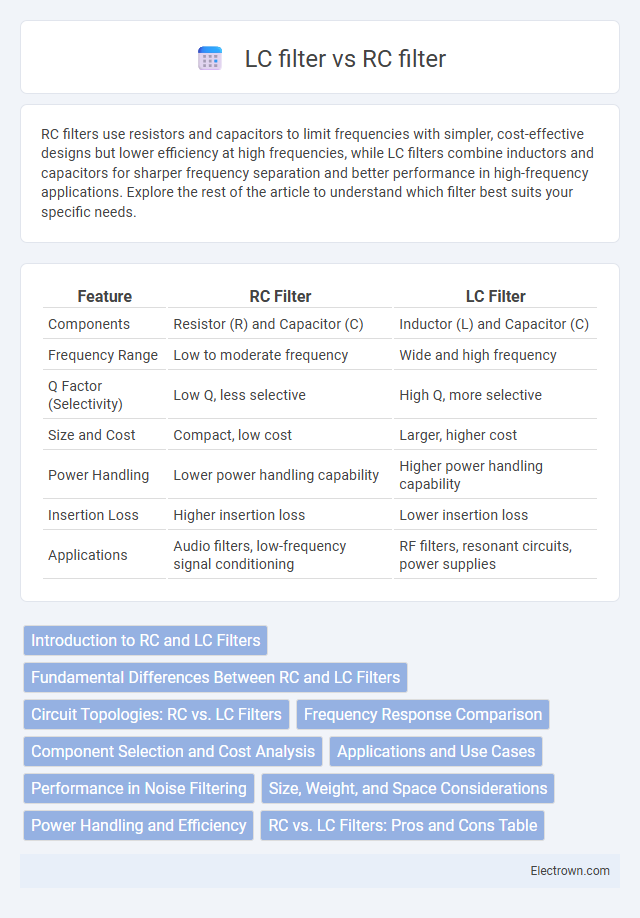RC filters use resistors and capacitors to limit frequencies with simpler, cost-effective designs but lower efficiency at high frequencies, while LC filters combine inductors and capacitors for sharper frequency separation and better performance in high-frequency applications. Explore the rest of the article to understand which filter best suits your specific needs.
Table of Comparison
| Feature | RC Filter | LC Filter |
|---|---|---|
| Components | Resistor (R) and Capacitor (C) | Inductor (L) and Capacitor (C) |
| Frequency Range | Low to moderate frequency | Wide and high frequency |
| Q Factor (Selectivity) | Low Q, less selective | High Q, more selective |
| Size and Cost | Compact, low cost | Larger, higher cost |
| Power Handling | Lower power handling capability | Higher power handling capability |
| Insertion Loss | Higher insertion loss | Lower insertion loss |
| Applications | Audio filters, low-frequency signal conditioning | RF filters, resonant circuits, power supplies |
Introduction to RC and LC Filters
RC filters use resistors and capacitors to control signal frequencies, commonly applied in low-pass and high-pass filtering due to their simple design and ease of implementation. LC filters incorporate inductors and capacitors, offering higher selectivity and efficiency for band-pass and band-stop applications, especially in RF and audio circuits. The choice between RC and LC filters depends on factors like frequency range, filter order, and power handling requirements.
Fundamental Differences Between RC and LC Filters
RC filters use resistors and capacitors to control signal frequencies primarily through resistive and capacitive impedance, making them simpler and more cost-effective for low-frequency applications. LC filters combine inductors and capacitors to achieve sharper frequency selectivity and better performance at higher frequencies due to inductive reactance and energy storage properties. When choosing between them, your decision depends on the frequency range, quality factor, and application requirements, with LC filters offering superior efficiency in high-frequency circuits.
Circuit Topologies: RC vs. LC Filters
RC filters use resistors and capacitors to create simple, low-cost circuits ideal for high-frequency applications with moderate selectivity, while LC filters combine inductors and capacitors to provide sharper frequency cutoff and higher quality factor in resonant topologies. Your choice depends on desired performance; LC filters excel in applications needing precise frequency control and low loss, whereas RC filters suit compact, low-power designs. LC circuits can be more complex and bulky due to inductors, while RC circuits offer easier integration in integrated circuits.
Frequency Response Comparison
RC filters exhibit a gradual frequency response with a single pole roll-off rate of 20 dB/decade, making them suitable for simple low-pass or high-pass applications. LC filters provide a much sharper cutoff and higher selectivity due to their resonant nature, offering steeper roll-off rates and better frequency discrimination. Your choice depends on whether you prioritize simplicity and cost (RC) or enhanced frequency response and signal purity (LC).
Component Selection and Cost Analysis
RC filters use resistors and capacitors, which are generally inexpensive and readily available, making them cost-effective for low-frequency applications. LC filters employ inductors and capacitors, where inductors tend to be larger, heavier, and more expensive due to their construction and material requirements. The choice between RC and LC filters often balances component cost against performance needs, with LC filters offering superior frequency selectivity at a higher price point.
Applications and Use Cases
RC filters are commonly used in audio electronics, signal processing, and simple noise reduction due to their low cost and easy implementation. LC filters find applications in radio frequency circuits, power supplies, and communication systems where higher selectivity and lower signal loss are essential. Your choice between RC and LC filters should consider the frequency range and performance requirements specific to your application.
Performance in Noise Filtering
LC filters outperform RC filters in noise filtering due to their higher quality factor (Q), providing sharper cutoff frequencies and better attenuation of unwanted signals. The inductor and capacitor in LC filters create resonant circuits that effectively reject noise over a narrow bandwidth, enhancing signal clarity. Your choice of filter type directly influences noise suppression efficiency, especially in high-frequency applications where LC filters excel.
Size, Weight, and Space Considerations
RC filters are generally smaller and lighter than LC filters due to the simplicity of their resistors and capacitors, making them ideal for compact electronic circuits. LC filters, consisting of inductors and capacitors, tend to be bulkier and heavier because inductors require more physical space and often use magnetic cores. Space considerations often favor RC filters in portable devices, while LC filters are preferred in applications demanding higher performance despite their larger size.
Power Handling and Efficiency
LC filters typically offer higher power handling capabilities and greater efficiency compared to RC filters, making them suitable for high-frequency and high-power applications. LC filters have lower power dissipation due to inductors and capacitors storing and transferring energy without resistive losses, whereas RC filters rely on resistors that convert excess energy into heat. Consequently, LC filters deliver better performance in systems demanding efficient power management and reduced energy loss.
RC vs. LC Filters: Pros and Cons Table
RC filters offer simple design, low cost, and ease of integration, making them ideal for low-frequency applications, while their performance is limited by higher signal loss and lower selectivity. LC filters provide superior quality factors, sharper cutoff slopes, and minimal signal attenuation, suitable for high-frequency and RF circuits, but they require larger, more expensive inductors and are more complex to implement. Your filter choice hinges on balancing cost, frequency range, and performance needs between RC simplicity and LC precision.
RC filter vs LC filter Infographic

 electrown.com
electrown.com